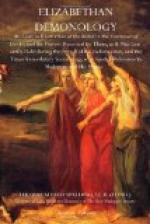9. The object, therefore, which I have had in view in the compilation of the following pages, is to attempt to throw some additional light upon a condition of thought, utterly different from any belief that has firm hold in the present generation, that was current and peculiarly prominent during the lifetime of the man who bears overwhelmingly the greatest name, either in our own or any other literature. It may be said, and perhaps with much force, that enough, and more than enough, has been written in the way of Shakspere criticism. But is it not better that somewhat too much should be written upon such a subject than too little? We cannot expect that every one shall see all the greatness of Shakspere’s vast and complex mind—by one a truth will be grasped that has eluded the vigilance of others;—and it is better that those who can by no possibility grasp anything at all should have patient hearing, rather than that any additional light should be lost. The useless, lifeless criticism vanishes quietly away into chaos; the good remains quietly to be useful: and it is in reliance upon the justice and certainty of this law that I aim at bringing before the mind, as clearly as may be, a phase of belief that was continually and powerfully influencing Shakspere during the whole of his life, but is now well-nigh forgotten or entirely misunderstood. If the endeavour is a useless and unprofitable one, let it be forgotten—I am content; but I hope to be able to show that an investigation of the subject does furnish us with a key which, in a manner, unlocks the secrets of Shakspere’s heart, and brings us closer to the real living man—to the very soul of him who, with hardly any history in the accepted sense of the word, has left us in his works a biography of far deeper and more precious meaning, if we will but understand it.
10. But it may be said that Shakspere, of all men, is able to speak for himself without aid or comment. His works appeal to all, young and old, in every time, every nation. It is true; he can be understood. He is, to use again Ben Jonson’s oft-quoted words, “Not of an age, but for all time.” Yet he is so thoroughly imbued with the spirit and opinions of his era, that without a certain comprehension of the men of the Elizabethan period he cannot be understood fully. Indeed, his greatness is to a large extent due to his sympathy with the men around him, his power of clearly thinking out the answers to the all-time questions, and giving a voice to them that his contemporaries could understand;—answers that others could not for themselves formulate—could, perhaps, only vaguely and dimly feel after. To understand these answers fully, the language in which they were delivered must be first thoroughly mastered.




